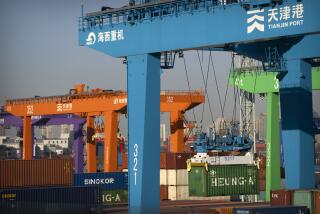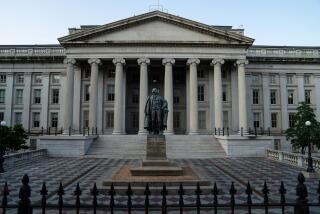OECD lowers U.S. economic forecast, implores world policymakers to ‘act now’ to boost growth
- Share via
A leading international group Wednesday downgraded its forecast for the U.S. economy and implored policymakers around the world to “act now” to boost growth.
The Organization for Economic Cooperation and Development, composed of the 34 most advanced economies, said the Federal Reserve and other central banks have done all they can with low – and in some cases below-zero – interest rates.
Now it is up to governments in the U.S. and elsewhere to increase spending to jolt the global economy out of a “low-growth trap.”
See more of our top stories on Facebook >>
“Without comprehensive, coherent and collective action, disappointing and sluggish growth will persist, making it increasingly difficult to make good on promises to current and future generations,” Catherine L. Mann, the OECD’s chief economist, said as the group released its semiannual world economic outlook.
“Citizens of the global economy deserve a better outcome,” she said, calling the need to act “urgent.”
The U.S. economy will expand 1.8% this year, down from 2.4% last year, the OECD said. The forecast is down from 2.5% in November and 2% in an interim report in February.
The world economy is forecast to expand 3% in 2016, the same as in the earlier forecasts. Slower growth in the U.S. will be offset by slightly stronger performances in Europe and Japan, the OECD said.
SIGN UP for the free California Inc. business newsletter >>
The global recovery from the 2008 financial crisis “remains disappointingly weak,” the OECD report said.
Slow wage growth and subpar business investment is causing only modest economic expansion in the U.S. and other advanced economies. And low prices for oil and other commodities have hurt developing nations.
Comprehensive national fiscal initiatives are needed to stimulate stronger economic growth, the OECD said. But the world’s leading economic powers have yet to take those steps.
While warning of economic risks, the Group of Seven leading industrialized nations – including the U.S., Germany and Japan – failed to come up with any coordinated spending plans at a summit last week.
MORE FROM BUSINESS
U.S. stocks open lower after signs of weakness in China
If Facebook promotes propaganda, can it be a neutral news platform?
Will our best and brightest leave? Most new L.A. jobs will be low paying, report warns
Follow @JimPuzzanghera on Twitter
More to Read
Inside the business of entertainment
The Wide Shot brings you news, analysis and insights on everything from streaming wars to production — and what it all means for the future.
You may occasionally receive promotional content from the Los Angeles Times.











